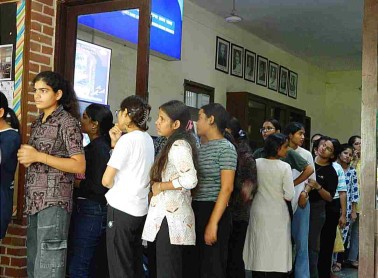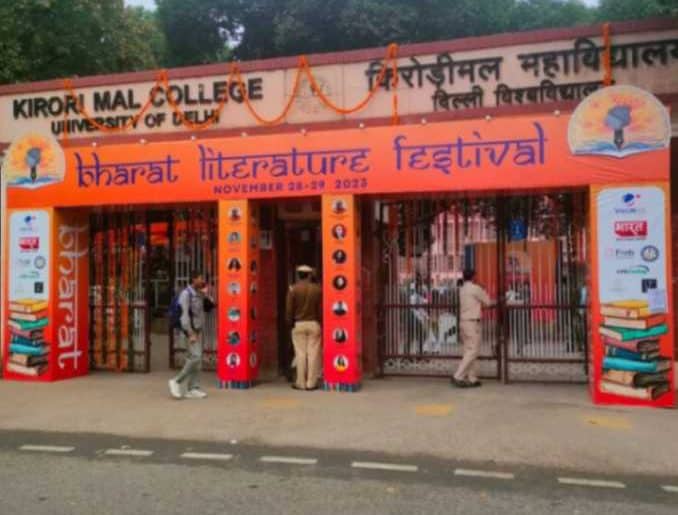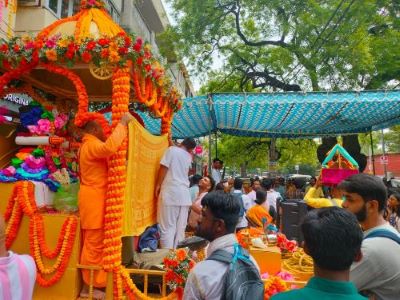DU politics can be seldom described as “Chacha Vidhayak hain humare,” but no one is interested in addressing the people they are about to serve, or at least promise to serve.
Try describing Delhi University (DU), and you will realise that politics is inseparable from it. When we turn the pages of history, we see DU emerge as a political hub that we never knew existed. These pages of history stand as proof that the protest culture, which is still so ingrained in DU students, emerges from a time where all that mattered was the notion of freedom, and to live and breathe independently. However, in 2023, all of this can be described as “bigoted irony.”
And as we take a sip of tea, here we are, days away from experiencing the Delhi University Students’ Union (DUSU) elections, which are back after a hiatus of three years. While all the organisations are busy preparing for it, however nobody is actually dwelling on the reason behind these elections.
Being one of the greatest democracies in the world, “democratic politics” plays an instrumental role in shaping our nation. While mainstream politics may be at the core of this country, DUSU breathes at the core of this mainstream alignment. If we try to draw parallels between the two, the story may turn out to be much more similar than what we comprehend. The result of both political scenarios is the same: the common man and the common students are the ones who suffer.
Political campaigns and rallies are an important part of the “election culture,” but in a varsity that is as dynamic as DU, it becomes quintessential to address the solutions to the problems that are eroding its structure. When men climbed the walls of Indraprastha College for Women (IPCW) and Miranda House, or when a ceiling fan fell on a student of Lakshmibai College, the contesting student organisations did voice the students’ concerns, but only a few did, and those few completely took away the focus from the students to themselves.
Arguments may be presented that when any political outfit addresses a problem, it may get politicised, but when the parties and organisations clearly act in a way that adds to their advantage, I think we lose the main reason for even having elections and choosing the candidate that should have “represented students.”
So, when everyone around is so focused on the elections and the candidates, the question about the students is completely neglected. DU’s political atmosphere includes everything except for the concerns of the students. With or without the elections, most of the students of the varsity feel that it does not matter who comes to power, as they will be neglected either way.
Vijeyta Panjwani, a student of Miranda House, expressed that while organisations like the All India Students’ Association (AISA) and the Students’ Federation of India (SFI) pick up on student concerns, others like the National Students’ Union of India (NSUI) or Akhil Bharatiya Vidyarthi Parishad (ABVP) tends to be missing in action. However, the entire matter often gets politicised, and the focus shifts away from the core problem and the students.
The ones who stood up for Students
When things did not go as planned at IPCW’s annual fest Shruti 2023, a few student organisations did take up the issue and protested for it. The students at the college went through a traumatic experience. When asked about the entire thing, they do recognise the efforts that were put in by the political outfits, but at the same time, they felt that soon the matter became something that was only concerned with the politics and not what the men did with the students of the college or how some students were locked up or were asked to leave their own college while outsiders were still in.
However, the contesting candidates have a different tale to tell. While the students may feel neglected, according to these candidates, that might not be accurate, and as one of them expressed, “We are humans too. We can’t take up each and every problem, but try to take up as many as possible,” for which I can give them a little credit. Nevertheless, when we take a look at the broader picture, not everything meets the eye.
Aditi Tyagi, a SFI state committee member who is contesting for the general secretary’s position, explained that each issue that emerges in the campus space is political. According to her, the organisations work as a bridge to get the media focused on student issues, and in the process, it might look like that issue has been politicised. She believes that without these outfits, student issues might never come up. Aditya, a member of AISA who is contesting for the secretary’s position, on the other hand, said, “Issues did not get politicised earlier. Now they get as a result of the idea to dominate each issue under the current organisation that is in power.”
One side of the politics is all up to take up the student concerns, and though it comes at the cost of politization, the other side dictates a tale that is no less than blatant hypocrisy.
Will they Stand with the Students?
One does not have to dig into the past to see what went wrong when we take a look at organisations like ABVP and NSUI. The campus space has been engulfed with sloganeering, pamphlet throwing, and, of course, the endless SUVs and huge banners, and “coincidentally,” they all belong to just two of the outfits: ABVP and NSUI.
NSUI is a name that does not resonate with a lot of students on campus since, according to the latter, they were nowhere to be seen over the months. However, the organisation has claimed that they have always stood up for the students, especially women-centric issues, though they could not point out any specific incident other than the gruesome act that took place in Manipur. The question about the students of DU still hangs dry for them.
Hitesh Gulia, a NSUI member who is contesting for the president’s position, has a vision to resolve the issues of fee hikes and women’s safety and wants to start a global youth festival. When asked about their absence in comparison to other organisations, Gulia pointed out that they are the first ones who pick up any issue that arises in the campus, but he could not particularly pin-point anything concrete except for the OBE protest, which happened earlier last year.
If we take a look at the campaigning of the ABVP, firecrackers were burned in Shayam Lal College and Deshbandhu College, fights broke out in Ram Lal Anand College, Ramunujan College’s gate was broken, and male candidates broke into Miranda House; this may not be too appealing to earn the votes of the students. However, the organisation claims to function in the most democratic way and has assured that they were always and would be with the students, though they have also claimed with sheer confidence that no matter what, they would again come back to power.
While other organisations did express their “concerns” about how the ones in power do not resonate with students, intimidate them, and do not look like one of them, the ones in power stood by their seemingly “strong moral grounds.” Speaking with Ankita Biswas, who is a part of ABVP but whose nomination did not get clearance, she stated that the organisation works for the students around the year, irrespective of the fact that the students may feel otherwise.
When asked about the recent incident in Miranda House where ABVP members scaled up the gates, including herself, she explained, “Our supporters get enthusiastic, and in that moment, they might do such things. As for Miranda House, the administration made us stand out for over 1.5 hours and did not allow us to carry out our campaign, which is a part of this democratic process.” Ashish Kumar Singh, another ABVP member, further explained that, as per the directions of the organisation, they are allowed to take just three cars for three candidates in colleges for campaigning. When asked about it, Biswas remarked, “What is wrong with it?” Well, it is safe to say that ABVP’s supporters are a little too zealous, which “might have” caused a little too much trouble for the common students.
No matter which ideology an organisation is inclined towards, all of them have one thing in common, and that is their assertion that they are with the students and they will be with the students, irrespective of these elections. Students have, however, lost their confidence in this democratic practice, and as for me, I still had a few questions left, but all I got from the karyakarta (s) was, “Muddhe muddhe pe depend karta hai, ab mai kya hi karu?”
Read Also: Under the Shadow of DUSU Elections: A Stage for Sexual Harassment and Caste-based Politics
Featured Image Credits: Ankita Baidya for DU Beat
Ankita Baidya
[email protected]










